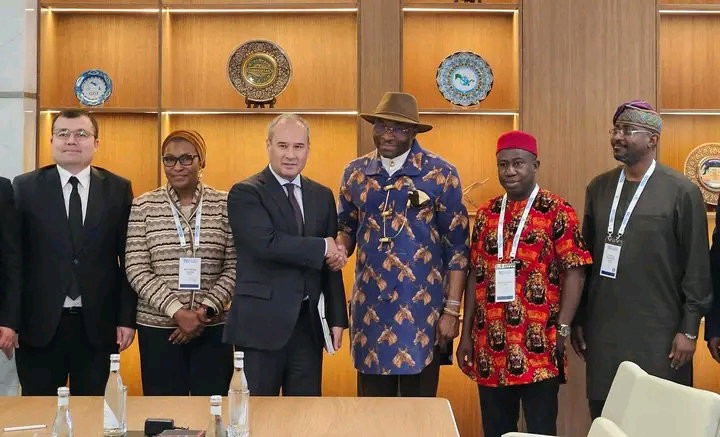𝐈𝐝𝐞𝐧𝐭𝐢𝐭𝐲 𝐁𝐚𝐬𝐞𝐝 𝐂𝐨𝐧𝐟𝐥𝐢𝐜𝐭𝐬: 𝐁𝐞𝐧 𝐊𝐚𝐥𝐮 𝐃𝐞𝐥𝐢𝐯𝐞𝐫𝐬 𝐊𝐞𝐲𝐧𝐨𝐭𝐞 𝐀𝐝𝐝𝐫𝐞𝐬𝐬 𝐀𝐭 𝟐 𝐃𝐚𝐲 𝐍𝐚𝐭𝐢𝐨𝐧𝐚𝐥 𝐄𝐧𝐠𝐚𝐠𝐞𝐦𝐞𝐧𝐭
.........𝒂𝒔 𝒕𝒉𝒆 𝒏𝒂𝒕𝒊𝒐𝒏 𝒔𝒆𝒆𝒌𝒔 𝒂 𝒍𝒐𝒏𝒈 𝒍𝒂𝒔𝒕𝒊𝒏𝒈 𝒔𝒐𝒍𝒖𝒕𝒊𝒐𝒏 𝒕𝒐 𝒕𝒉𝒆 𝒍𝒊𝒏𝒈𝒆𝒓𝒊𝒏𝒈 𝒔𝒆𝒄𝒖𝒓𝒊𝒕𝒚 𝒄𝒉𝒂𝒍𝒍𝒆𝒏𝒈𝒆𝒔 𝒊𝒏 𝒕𝒉𝒆 𝒄𝒐𝒖𝒏𝒕𝒓𝒚
Identity-based conflicts have been a major hindrance to achieving sustainable peace in many countries around the world.
These conflicts arise from differences in religious, ethnic, cultural, or political identities, and often result in violence, discrimination, and human rights abuses.
In Nigeria, these conflicts have been particularly prevalent, leading to loss of lives and property, and hindering the country's efforts towards development and unity.
Recognizing the urgency of addressing these conflicts, the Deputy Speaker of the House of Representatives, Rt Hon Benjamin Okezie Kalu, recently addressed a 2-day national engagement focused on "Mapping Actors to Reduce Identity Conflict".
The event, organized by the International Republican Institutions (IRI) and National Endowment for Democracy (NED), brought together key stakeholders including government officials, civil society organizations, community leaders, and international partners to discuss solutions to this pressing issue.
In his keynote address, Rt Hon Kalu emphasized the need for collaboration between all actors in order to effectively tackle identity-based conflicts.
He highlighted the importance of policies and frameworks that address the root causes of division, rather than just dealing with the symptoms.
This approach, he noted, is crucial in harnessing the diversity of Nigeria as a source of strength, rather than a source of division.
The Deputy Speaker's speech comes at a crucial time when Nigeria is facing a number of identity-based conflicts.
From clashes between farmers and herders to religious and ethnic tensions, these conflicts have taken a toll on the country's social, economic, and political fabric. However, the recent engagement presents an opportunity to address these issues and work towards sustainable peace.
It is important to note that identity-based conflicts do not arise overnight. They are often rooted in a history of marginalization, discrimination, and unequal access to resources and opportunities.
Therefore, addressing these conflicts requires a multi-faceted approach that takes into consideration the complex dynamics of identity and power.
One key element in achieving sustainable peace through addressing identity-based conflicts is the involvement of all stakeholders.
Government officials must work closely with civil society organizations, community leaders, and international partners to develop inclusive policies and strategies.
Community engagement and dialogue are also crucial in building trust and understanding among different groups.
Moreover, education and awareness play a vital role in addressing identity-based conflicts. It is important for individuals to understand the diverse identities that make up their society and to embrace the values of tolerance and inclusivity.
This can be achieved through educational programs and campaigns that promote diversity and peaceful coexistence.
Let me conclude by saying that the recent engagement on addressing identity-based conflicts is a step in the right direction towards achieving sustainable peace in Nigeria.
It is imperative that all stakeholders continue to work together, using a holistic approach, to address the root causes of division and build a more united and peaceful nation.
The Deputy Speaker's call for collaboration and commitment to this cause is a reassuring sign that the Nigerian government is taking proactive measures towards sustainable peace.
It is hoped that this momentum will continue and result in tangible solutions that will pave the way for a more peaceful and prosperous future for all Nigerians.
𝓘𝔂𝓴𝓮 𝓜𝓫𝓪
𝙎.𝙇.𝘼 𝘿𝙀𝙥𝙪𝙩𝙮 𝙎𝙥𝙚𝙖𝙠𝙚𝙧 𝙃.𝙊.𝙍













Comments
Post a Comment
For advert placing, call 08024114163